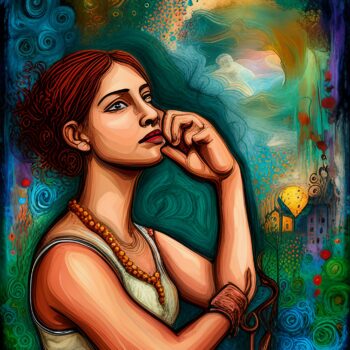Dreams
He’d heard it from his aunts, from his grandparents, from old family friends: how his mother had been a star in her youth. She’d had so many talents! And from those talents had grown the most bombastic dreams.
She’d had a remarkable gift for cooking, for instance. At 12, she’d already been selling in the school playground all these beautiful little cakes she’d made, using the proceeds to buy new ingredients and try more and more adventurous recipes. By 15, she’d been coming up with her own unique and delicious curries, moussakas, soups and salads… People had sometimes come from other towns, knocked on the door, said they’d heard about her culinary creations, and longed to try one. Everyone had said she would have her own restaurant one day, or no, a chain of restaurants, and there’d be Michelin stars all over the walls and all the most famous people and rich tourists and royalty would come and eat there.
But cooking had not been enough for his mother, apparently. According to the stories, even more than cooking, she’d loved sport. She’d played football and tennis for her school. For the football team, she’d broken the record for the most goals scored in a season – while playing as a defender! At tennis, she’d easily beaten the coaches. Soon she’d been playing not only for the school, but for the town too – with the adults. Their youngest ever player. Everyone had said she’d play for her country one day – the only question was would it be tennis or football?
But sport had not been enough for her either! What she’d really loved most, everyone said, was telling stories, writing, wordsmithery! Even as a child, she’d composed little plays for her and her siblings and the kids next door to perform for the grown-ups, using the veranda at the back of the house as a stage, and some bedsheets as the grand curtains which would open at the start of the show and close at the end to rapturous applause. As a teenager, she’d started writing poems – poems about the strangeness of becoming a woman, about hope and fear, about the difficulty of knowing who we really are… And friends she’d shared those poems with had never forgotten them, as they’d felt that they captured perfectly what they too were going through. Just before leaving school, she’d started work on a novel, about – or so his aunt had told him – a girl who turned magically into a bird and flew around the world, chasing the sunset. Everyone had said she would be a famous writer and probably win a Nobel Prize or something one day.
But she hadn’t finish that novel. A time had come when storytelling had not been enough for her, not even in combination with sport and cooking and who knows what else. That was the time after she had met his father, and all she could really see was this man. A time of madness, she called it later. He’d been older than her… The perfect match, everyone agreed. A manager of a bank, charming and disciplined, smart and ever ready with a joke. And she’d been managed a treat, and she’d been charmed, and the joke had been on her. First there’d been a child on the way, then a rushed wedding, then another child, then another, and then this man, his father, had simply disappeared. Gone. Who knows where. A letter left behind had said only, ‘this was not the life for me’.
And suddenly his mother had been alone, with three children and few formal qualifications and no money. She’d started working as a cleaner, then as an assistant to the manager of the cleaning company, then as a secretary for an accounting firm. Anything to pay the bills, put food on the table for him and his siblings, give them opportunities. And all those old dreams of hers? Forgotten. Or buried. Or changed?
Because true, she had not opened a restaurant, or spoken of opening a restaurant, but she had cooked the most wonderful food for him and his siblings, food that had made them grow up healthy, and always run for the kitchen table when the meal was ready and sit happily together, eating and telling each other of their days.
And she had not played for her country, neither football nor tennis, but she had taken them to the park or the sports centre most evenings and weekends, and brought them up running, jumping, learning how to win, learning how to lose, learning to play for the team and make what difference they can.
And she had not won a Nobel Prize, but she had told them stories that had helped them make sense of life, make sense of what they were and what they should do and why, stories that had helped them see beauty all around them, and see the traps in their paths and how to dodge them.
Recently he took his mother, now nearly old, out to a restaurant, and they met there a woman who’d known her at school. And, all excited, this woman asked his mother what she’d ended up doing with her life. And as this woman heard the answer, her face fell. You could have been great! the fallen face said. This is a tragedy! You have wasted your talents! And he thought, yes, it is a tragedy that his mother had not been able to follow the dreams of her youth, and a great injustice too, not least as his father had presumably got to follow his, and they were probably pretty shit dreams compared to his mother’s. But, though he was perhaps biased, he could not completely agree that his mother had wasted her talents. Perhaps parents – even great ones – are just too normal, he thought, too normal for us to be able see, without special effort, the creative and practical enormity of what they do.
As they left the restaurant, he asked, do you remember that novel you were writing when you left school – about the girl who transformed into a bird and chased the sunset – do you think you’ll maybe try and finish it? Now that we’ve all left home, and you’re soon to retire? And she said maybe. And then she asked him when he was going to give her some grandchildren, and he got a bit awkward.
Text by Anonymous
In response to the letter by Ogün Çifci:
Whenever I think about whether or not I can fulfill my dreams, I think of my mother. It must be a very diUicult feeling when a marriage at a young age interrupts all your dreams. Years pass and only traces of those dreams remain. On the other hand, the things that are in my hands even give me the opportunity to choose which dream to pursue. It is a great injustice when you think about it. I don’t know how much my mother felt this injustice, but even thinking about it makes me uncomfortable. She could have had a diUerent, maybe better life. However, I also know that there are countless women in my mother’s situation. I see that women who cannot have a say in their future are still a large segment today and they have a hard time making their voices heard. It would be nice to be with people who are fighting against this situation. Let’s make sure that all women, including my mother, hold on to their dreams.


Add comment